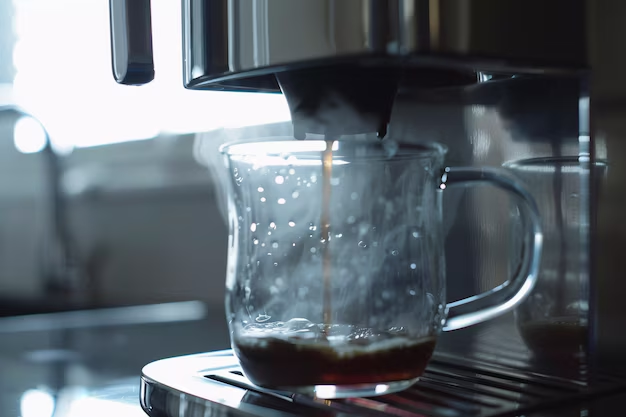How Fresh Is Your Cold Brew? Exploring the Shelf Life of Brewed Coffee in the Refrigerator
Brewed coffee isn’t just a morning ritual for many—it's a beloved companion throughout the day. Whether you brew a fresh pot every morning or prefer the convenience of keeping some on hand, it’s important to know how long your coffee remains tasty and safe to drink once it's been brewed. In this guide, we will explore how long brewed coffee lasts in the refrigerator and offer some handy tips to maximize its freshness.
☕ Why Store Brewed Coffee in the Fridge?
Let's start by understanding why you might want to store brewed coffee in the first place. Imagine you’ve brewed too much to consume in one sitting or you enjoy cold brew regularly; refrigerating your coffee can be an appealing solution. Refrigeration slows down the degradation process of coffee, preserving its flavor profile and extending its usability, making it a convenient option for coffee enthusiasts who crave quality and convenience.
The Longevity of Refrigerated Brewed Coffee
The Basic Time Frame
In general, brewed coffee can last up to 3-4 days in the refrigerator. However, its quality might begin to deteriorate sooner. Several factors influence just how long that Joe stays fresh—and delicious—while sitting in your fridge.
Factors Affecting Shelf Life
- Type of Coffee: Stronger brews or darker roasts tend to keep their flavor longer compared to lighter brews.
- Storage Container: Airtight containers help preserve freshness better than those that allow air ingress.
- Original Brew Temperature: Coffee brewed hot and then refrigerated tends to last longer because initial brewing extracts the full range of flavors.
- Additives: Coffee with milk or cream and sugar degrades faster than plain black coffee due to bacterial growth from the milk or cream.
Signs of Spoilage
Knowing when your coffee has gone south is as important as preserving it. Here’s how to tell if your fridge-stored brew is still consumable:
- Off Smell or Taste: A sour, rancid taste or smell is a key indicator that your coffee has spoiled.
- Mold Growth: Visible mold, often a result from improper storage, is a definite no-no.
- Separation: This is particularly relevant for flavored or cold brew coffees, where oils or other ingredients may separate unusually.
Maximizing the Freshness of Your Brew
Choosing the Right Container
Airtight Glass or Stainless Steel Containers are ideal choices for storing brewed coffee in the fridge. These materials do not impart additional flavors and are easy to clean.
Storage Tips
- Cool it Quickly: Once brewed, allow coffee to cool to room temperature before refrigerating. Rapid cooling can help maintain flavor.
- Separate Containers: If you add milk or sweeteners, store them separately and mix close to the time of consumption.
Brewing Tips for Longevity
- Cold Brew Method: Cold brew coffee inherently lasts longer when stored due to its brewing method, which does not involve heat and hence reduces the risk of rapid degradation.
- Concentrate Approach: Brew coffee concentrate which can be diluted per serving, allowing the concentrate itself to have a more extended shelf life.
Practical Recommendations
Your Guide to Coffee Preservation
Use these strategies to enhance your brewed coffee’s refrigerator life:
- ☝️ Brew Fresh: Always favor freshly brewed coffee for storage.
- 🥤 Opt for Cold Brew: If extended storage is essential, cold brewing is your friend.
- 🎯 Keep it Simple: Store coffee black and add dairy or sweeteners just before drinking.
- 🕒 Monitor Age: Write down the storage date on containers to keep track.
- 🌡️ Consistent Temperature: Keep your refrigerator at a stable cold temperature.
Coffee’s Cousins: Other Brews and Their Shelf Lives
Understanding how other coffee varieties behave helps round out a food storage plan:
- Iced Coffee: With ice, the shelf life reduces compared to refrigeration without it.
- Espresso: With its concentrated nature, espesso is great for immediate consumption, not storage.
- Nitro Coffee: Similar to cold brew, this coffee is nitrogen-infused which can prolong freshness.
Alternate Uses for Leftover Coffee
If you find yourself with excess brewed coffee, consider these alternatives:
Cooking and Baking
Coffee adds a depth of flavor to various dishes—try using leftover coffee in:
- Chocolate cake recipes
- Marinating meats
- Flavoring ice creams
Household Hacks
- Cleaning: Coffee’s acidic nature makes it an effective cleaner for pots and pans.
- Deodorizing: Use it to remove odors from your fridge or other spaces by leaving out a small dish of coffee.
Enhancing Your Green Thumb
- Composting: Coffee can be composted for an enriched soil mix.
- Plant Fertilization: Diluted coffee can be a quick nutrient boost for acid-loving plants.
Making the Most of Refrigerated Coffee
Refrigerated coffee has a valuable place in a busy lifestyle, offering both convenience and a touch of sustainability by reducing waste. By understanding how to adequately store and potentially repurpose your brewed drink, you can ensure your coffee ritual is consistently rewarding.
To make these tips practical, focus on discovering what works best in your daily routine. Feel free to experiment and adjust methods based on your taste preferences and consumption patterns. The ultimate goal is to enjoy a consistently satisfying cup of joe every time you reach for that chilled mug.
Here’s a quick recap with key takeaways:
📖 Brewed Coffee Fridge-Storage Cheat Sheet:
- 🕓 Lifespan: 3-4 days for best taste.
- 📦 Containers: Use airtight glass or stainless steel.
- 🥶 Tip: Cool it quickly before placing in the refrigerator.
- 🤔 Spoilage Signs: Sour smell, taste, or visible mold.
- 💡 Pro Strategy: Consider cold brews or storing as concentrates for maximum freshness.
Your perfect cup of coffee starts not just with the beans, but also with how you store and utilize your brew. Keep these guidelines in mind, and enjoy your coffee, just the way you like it, day after day.

